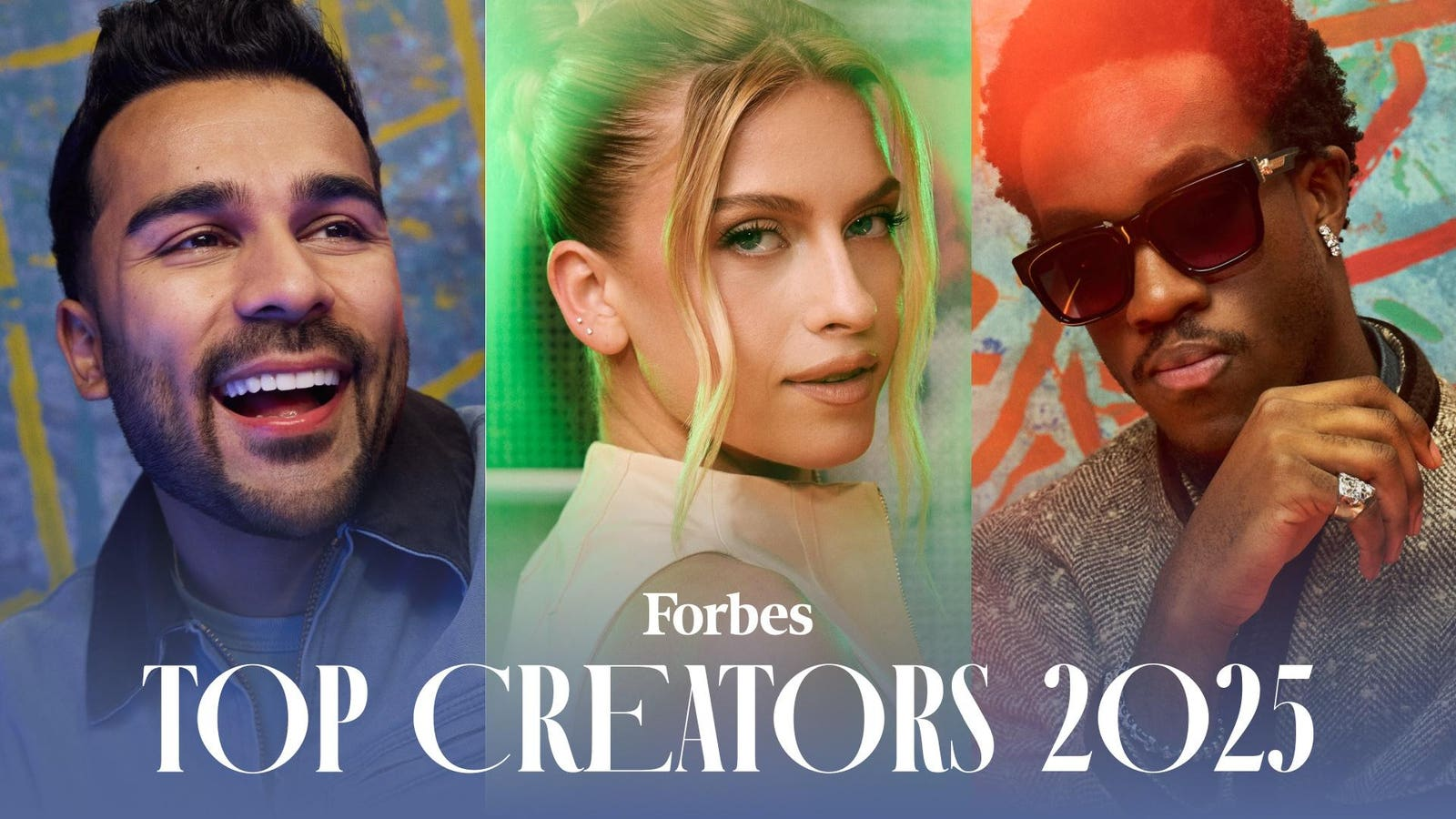Key takeaways from the young entrepreneurs and innovators who appeared at the Forbes Under 30 Summit 2023.
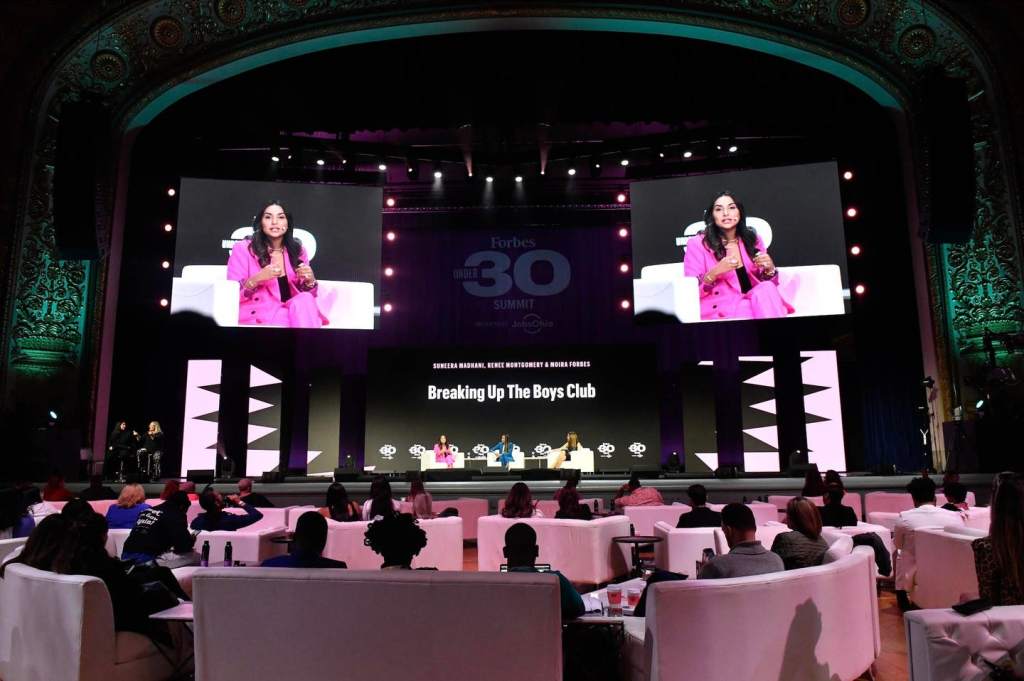
Breaking the bank—Fintech’s bold plan to fix finance for good
Between spiking interest rates, plummeting stocks and multiplying layoffs, it’s been a troubling year for fintech companies—and according to three founders who spoke on the Forbes Under 30 Summit 2023 stage, with these challenges came a whole lot of lessons.
“More than anything else, optimize your company for survival,” Ham Serunjogi, Under 30 Finance alum and founder of Chipper Cash addressed the entrepreneurs in the crowd. “There’s a lot of talk right now about this wartime for startups. I’d say that the number one rule of law of war is survival.”
Serunjogi himself knows what it takes to survive. Chipper Cash, which customers use to send money among seven nations including South Africa, went through a series of layoffs over the past year.
Serunjogi had to let go roughly 30% of his staff—an emotionally tolling decision for a company that previously had “lead with empathy” listed on its WEBSITE? as one its core values. The line has since been removed.
Layoffs can be brutal, both personally and professionally, which is why Vivian Tu, cofounder and CEO of YourRichBFF, says her best advice to founders would be to “stay lean as long as humanly possible.”
Tu understands this reality firsthand, having built her entire brand on her personal finance advice videos. The TikTok creator has amassed more than 5 million followers and made the Forbes Top Creators list for the second time this year.
Tu and Serunjogi, along with moderator and Forbes assistant managing editor Steven Bertoni, were joined by the founder of fintech platform Esusu Financial, Wemimo Abbey, who said that companies and consumers alike are in tough economic times.
Abbey’s advice to his fellow founders includes nuggets like make sure you don’t run out of money and understand debt. Most importantly, he says, entrepreneurs should always remember their worth.
“My advice to all the founders out there is: you’re enough,” Abbey, who was on the 2020 Under 30 Social Entrepreneurship list, says. “Whatever you do, just know you’re the embodiment of infinite possibilities.”
Model to mogul
Supermodel, reality TV star and now entrepreneur: Kendall Jenner has taken many titles in her life, starting her modeling career nearly 10 years ago and growing up in the public eye. But today, Jenner says her identity is closely tied to her alcoholic beverage company, 818 Tequila.
“I’d be lying if I said I haven’t had moments of self doubt and confusion,” Jenner told Forbes’ EVP and ForbesWomen publisher Moira Forbes. “The shift into being a founder and owning my business was a really cool way of getting to know myself.”
Jenner, 27, founded 818 in 2021 following in the footsteps of her entrepreneurial family. By the end of 2022, she had already sold more than 120,000 cases of the tequila, which is produced on a farm in Jalisco, Mexico.
Being a first-time founder can be nerve wracking, internationally famous celebrity or not, but Jenner says she’s learned to be a positive force and be willing to admit her mistakes.
“You face challenges, you make mistakes—knowing yourself and knowing how you handle things, and then moving accordingly, is super important,” she says. “There’s a learning curve to it all, but working with integrity and authenticity is always going to create positive results.”
Jenner speaks from experience: When the star first announced her tequila brand, she was accused of cultural appropriation. She says she’s now focused on emphasizing 818’s role as a socially conscious brand.
The founder told the crowd on Monday about how the company takes the agave fibers that are wasted during tequila production, turns them into bricks and donates them back to communities in Mexico.
The statement produced a loud round of applause—proving, once again, that Jenner knows how to work an audience.
Finding personal and professional peace with Rainn Wilson
We’re in church right now, even if we don’t know it,” according to actor, author and entrepreneur Rainn Wilson. Which deity did he say he and the Under 30 audience were worshiping?
Entrepreneurship.
As a young actor in the ‘90s, Wilson couldn’t find services or support for his mental health, and turned to religion and spirituality as a way to express his struggles.
Since then, the award-nominated actor, most well known for his role as Dwight Schute in the NBC sitcom The Office, has dedicated himself to increasing the conversations around spirituality and mental health.
Wilson’s focus on spirituality has fueled his business ventures: in 2008, amid the release of The Office’s fifth season, Wilson cofounded digital media startup SoulPancake, created with the aim of creating videos about what it means to be human.
“It’s imperative for both the mental health epidemic, and for the kind of disillusionment of the linchpins of western society, that we’re talking about spiritual solutions and spiritual connections,” Wilson told Forbes head of Impact Lab and Forbes Communities Seth Cohen.
He released his third book this year, Soul Boom: Why We Need a Spiritual Revolution.
Rates of institutionalized religion have declined in recent years, with roughly three in 10 U.S. adults reporting that they consider themselves religiously unaffiliated, according toPew Research.
But though religiously unaffiliated, Wilson believes even the worship of entrepreneurship can be for the greater good — finding that cause that can make the world a better place, and be profitable.
His advice for founders, especially those resisting the institutionalized form of spirituality? Align your personal passion with society’s greatest need.
“Search for greater meaning and create, ideate in service to that greater meaning,” he said.
Putting the biz in showbiz: Meeting the young stars shaking-up entertainment and entrepreneurship
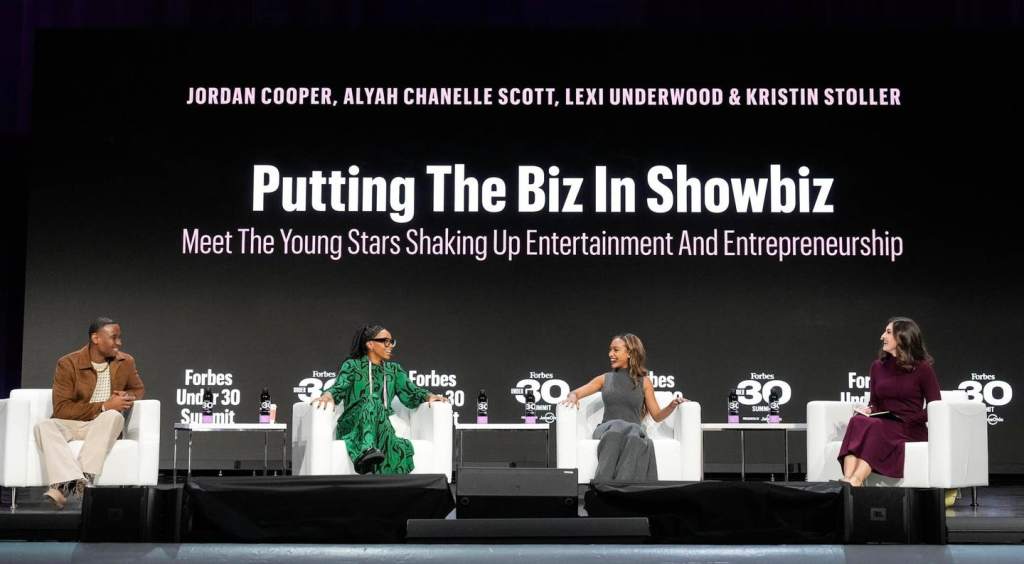
Today’s rising stars are up against steep competition when it comes to standing out in show business—but Jordan Cooper, Alyah Chanelle Scott and Lexi Underwood are trailblazers when it comes to creating opportunities for themselves.
In spite of a challenging climate for Hollywood— the Screen Actors’ Guild of America’s strike is ongoing and concerns about generative AI are rising—the three stars are cautiously optimistic about their futures.
Underwood said the current state of Hollywood is challenging everyone to rethink the ways stories are told.
As the founder of Ultimate Dreamer Productions, a production company she founded when she was 15 years old, she’s focused on increasing access for underrepresented creatives. Great content exists, she said, but their projects just aren’t being green-lit.
Along with Underwood’s work in film and TV, she, like Scott and Cooper, got her start in theater.
Cooper, who is now a Tony Award-nominated playwright, spent some of the early days in his career handing out fliers for his own show outside of Hamilton’s Richard Rodgers Theatre on 46th street.
“A lot of [my career has been] reminding myself that no matter where you go, and no matter how high you are on the mountain, you still have to work and hustle like you would in the valleys,” he said.
Scott knows this hustle well: She is the cofounder of Runyonland Productions, a production studio focused on Broadway. She said that despite Browadway often being hesitant to change, she and much of her generation are set on innovating the established industry.
She entered the production space in the hopes of affecting some structural changes that she wished to see as an actor and performer herself.
“As an actor, I felt disempowered in [traditional] spaces… I thought okay, screw it, I’ll just make my own and no one can tell me no,” Scott said. “I want [my production business] to care about the future of the industry… That’s really why it’s become my main passion.”
Breaking up the boys’ club
Renee Montgomery spent 11 years playing in the WNBA before becoming an owner of Atlanta’s WNBA team, the Atlanta Dream, in 2021. Today, along with being a partial owner of the club, she’s also an activist, sportscaster and entrepreneur.
She has also entered the venture capital space as a general partner at an investment firm to support female founders.
“I had to learn to take a no, I had to learn to take an ‘L,’” Montgomery told moderator Moira Forbes about her career evolution.
She added that “I took the same mentality that I had in sports [when it came to business]. My routine was not just get a task done, but get a task done at the highest level.”
Suneera Madhani, the founder of fintech company Stax, took a similarly relentless approach to building her company. But after Stax’s valuation hit $1 billion and was named a unicorn, Madhani saw few other founders in the unicorn club who looked like her.
It was a lonely feeling, and one that inspired her to think about her path in a different way.
“My legacy had to be much more than just building a billion dollar business next to my name,” Madhani said.
So when she learned that less than 2% of female founders ever break $1 million in revenue, she launched The CEO School, a podcast and platform to help other women founders on their entrepreneurial ventures.
“I always felt like I had to be a man in a skirt,” Madhani said. “When you actually lean into you, and your most authentic self, that’s when the success will happen.”
Food fight: Is fake protein for real?
Whether you’re a vegan, vegetarian or simply shopping at Trader Joe’s, chances are you’ve seen an increasing number of alternative meat on the shelves.
But some contradictory financial indicators—like the 35% decline in Beyond Meat’s share price so far this year—paired with an increasing number of vegetarians in the U.S. make it hard to parse the long-term potential of the alternative meat business.
Founders like Arturo Elizondo from EVERY, Peter McGuinness from Impossible and Ross Mackay from Daring are, naturally, bullish on a meat-free future.
“For people to say the category is dead, it hasn’t even gotten started,” McGuinness told Forbes Senior Editor Kristin Stoller. “The category is in its first gear. There are five gears, and we’ve got a lot of work to do.”
Unlike many plant-based product companies, EVERY engineers meat-free ingredients (think animal-free proteins) as opposed to main courses (like burgers and sausages).
That’s because manufacturing ingredients for other businesses is where Elizondo saw the most potential to make an impact.
“Most of these companies have soy and pea protein to work with,” Elizondo said of the limited toolkit, but he became curious about the products, flavors and ingredients that don’t even exist yet.
Sustainability is an oft-cited reason consumers choose alternative meat products, but all three founders on stage said that the subject could be taking more of a front-seat in their industry.
“Right now I don’t think enough people are concerned about climate. We’ve got to make our products delicious, we’ve got to make them more available… and then when you get further down the line when people are interested, we can talk about animal wealthfare, we can talk about climate,” McGuinness said.
Mackay agreed, saying, “We have to do a better job in taste, texture and price first.”
Turning a new leaf: Cannabis’ next billion dollar revolution
Cannabis is on track to become a $100 billion market by 2028. With 23 states and Washington D.C. already having legalized its recreational use, and 37 states allowing medical use, 78 million Americans say they’ve used marijuana at least once.
Founders are taking advantage of this growth. Rapper Berner, for instance, cofounded his cannabis company Cookies in 2010. Forbes estimates that Cookies now generates around $50 million in annual revenue and is valued north of $150 million.
The industry clearly has potential, but it’s turbulent right now due to constant changes and government regulations, Berner said. The way Cookies is standing out is by prioritizing the genetics of the products, he added.
2022 30 Under 30 Finance Lister Hannah Ross is coming at the industry from another angle, as a partner at Beehouse, an investment company exclusively focused on the legal cannabis space.
“It’s really hard to be an operator in this space,” she said. Transactions are often all-cash and the sector is misunderstood by much of the market and heavily regulated.
But, recently, more people are beginning to appreciate authentic brands in the space, which is providing growth opportunities.
Vince Ning, who founded cannabis wholesale company Nabis in 2018 is hopeful for a future with more research and education and the resulting industry growth.
“Newly legalized markets are obviously areas of high growth,” Ning said. “But you have to be careful who you invest in in those markets.”
Creating the next billion dollar startup
Austin Russell was 17 years old when he first got the idea for his machine perception technology company, Luminar Technologies. He was 25 when he became the world’s youngest self-made billionaire following his company’s IPO on the Nasdaq.
“Our generation has never had more information available at our fingertips,” Russell told Forbes Chief Content Officer Randall Lane. “If you start things off with that entrepreneurial mindset from the beginning, it’s amazing what you can do.”
The 28-year-old founder, who Forbes estimates has a $1.6 billion net worth, announced financing in September for an approximately $800 million acquisition of Forbes Global Holdings Inc.
The acquisition, which would make Russell the majority owner of Forbes Media, is expected to close sometime this fall.

Russell dropped out of Stanford University his first year of college. Traditional education, he says, isn’t the key to building a successful business.
He believes it’s about “the network of people and what you can learn from everyone else.”
Luminar, which has a market cap of $1.6 billion, develops laser-powered lidar (which stands for “light detection and ranging”) technology. Best described as sensors, this technology helps self-driving vehicles assess their surroundings.
Luminar’s clientele includes the likes of Tesla, Volvo and Mercedes-Benz in spite of competition from lidar developers like Aeva and Velodyne.
Russell’s advice to the 30-somethings in the Forbes audience? Make sure your business has a clear mission, and as a company, have the ability to foster strong partnerships.
Welcome to day 2 of the 30 Under 30 Summit
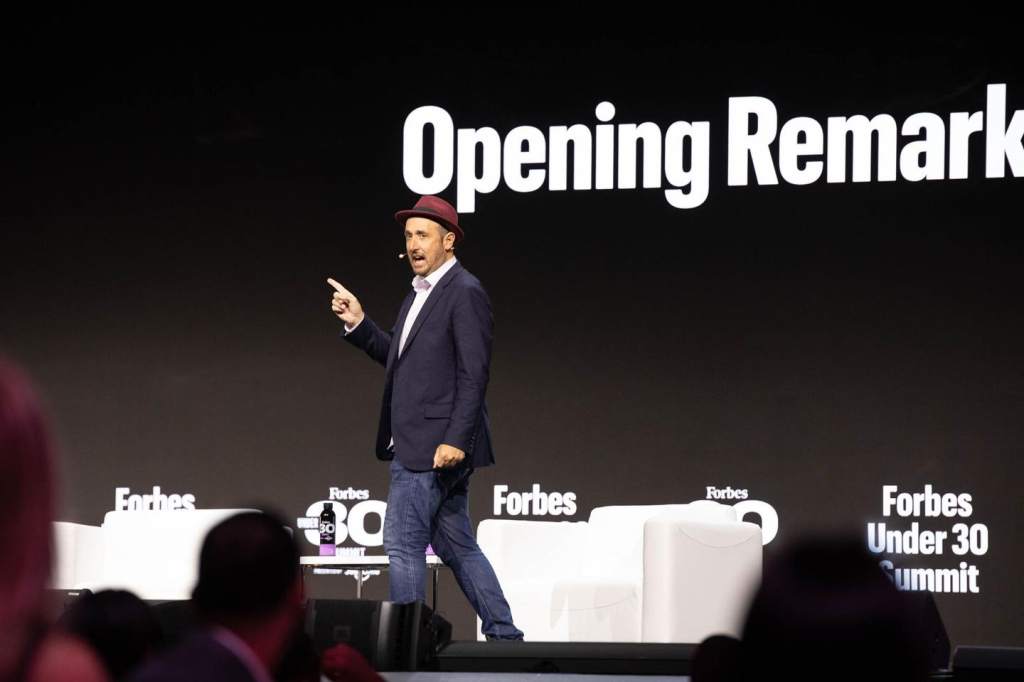
Randall Lane, the Forbes Chief Content Officer and founder of the Forbes 30 Under 30 list, opened day one of programming with a message about the power of the connections, innovation and excitement of the tenth annual summit.
“The next few days could change your life,” Lane told the thousands in the audience. “You’re in a room full of your next business partners, a room full of potential customers—and if none of that works out, I guarantee at least two of you are going to get married.”
Lane’s opening remarks followed an acoustic performance by singer, songwriter and Under 30 local Los Angeles Lister Madison Love, who has co-written award-winning songs with artists like Halsey and Selena Gomez—including “Him & I” and “Rare.”
Lane also invited Jon Husted, the Lieutenant Governor of Ohio, to the stage. He welcomed the crowd to the “innovation district” of Cleveland, where he said local and national businesses are leading innovations in healthcare, sustainability and more.
Halsey and Latto kick off the 2023 Under 30 Summit
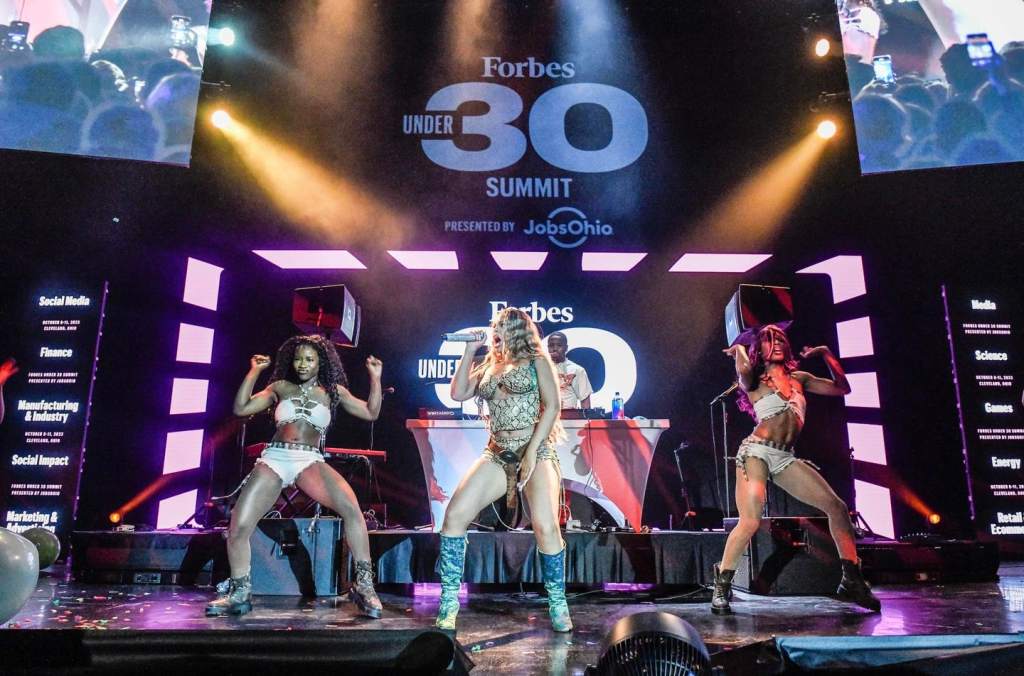
Halsey doesn’t want you to forget she’s still under 30. After seeing a comment online saying she was pushing 40, the award-winning musician said she was determined to headline the 2023 Under 30 Summit in Cleveland.
“I’m here tonight to remind you to have fun, to work hard, and that I am, in fact, under 30,” Halsey, who turned 29 last month, told the crowd.
During her second time performing at an Under 30 Summit, the 2016 Under 30 alum showcased her vocals with songs like “Without Me,” “Bad at Love” and “Graveyard.”
Setting the stage for Halsey, Ohio-born rapper Latto opened the show by returning to her birth state.
The two-time Grammy-nominated musician brought “Big Energy” to the stage with hits like “Muwop.” Confetti guns, smoke and balloons hyped up the thousands in attendance.
This article was first published on forbes.com and all figures are in USD.


